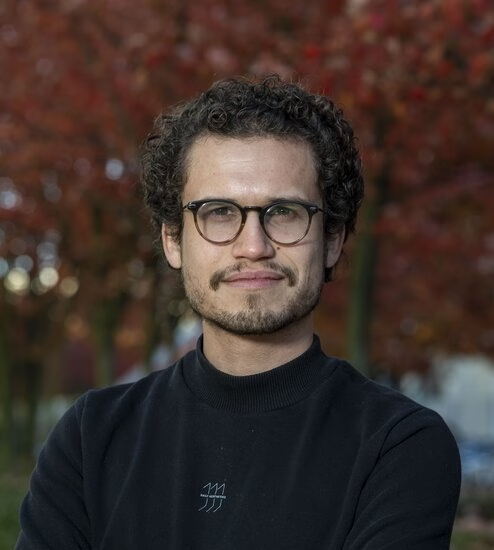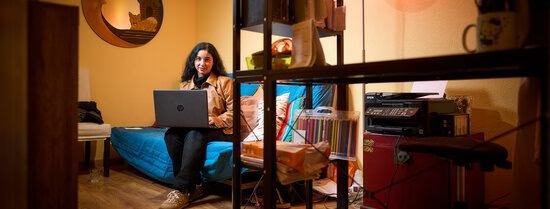Artificial intelligence depends on human labour to conduct tasks such as data cleaning, coding, and classifying content. This on-demand work is offered and performed online, paid by the task, on platforms like Amazon Mechanical Turk. Conceptualized as ‘ghost work’, this rapidly growing, platform-based work is largely unseen: workers are unable to speak with managers, do not get feedback, and lack labour protections. How do these specific work conditions influence ghost workers’ well-being?

About the project.
To ensure decent work conditions as automation continues to expand, knowledge about the effects of ghost work on well-being is urgently needed. The proposed project will develop and test an integrative framework for analysing the effects of ghost work on worker’s well-being. Existing models for analysing the impact of work conditions on well-being fall short for studying ghost work, as these models assume a person has a job and most likely an employer and colleagues. Therefore, this project begins from the specificities of ghost work to synthesize theories and concepts about algorithmic control, occupational well-being, human computation, and platform labour, in order to understand how and through which mechanisms ghost work influences well-being.

This project has received funding from the European Research Council (ERC) under the European Union’s Horizon 2020 research and innovation programme (grant agreement No. 101003134)
The relevance of this project
The project will contribute to and advance cross-disciplinary scholarship on platform labour and organizational studies of algorithmic technologies. Using a multi-methodological approach to study the effects of ghost work, it begins with in-depth interview-based fieldwork on ghostworkers’ work conditions, and then entails qualitative diary studies of the short-term dynamics of ghost work for worker’s work conditions and well-being. Finally, a 4-wave longitudinal panel study will investigate the relationship between ghost work and well-being over time. Scholars in multiple fields, as well as policy makers and industry leaders, will be keenly interested in both the resulting integrative framework and empirical findings.

Our researchers on Ghost Work
 prof.dr. Claartje ter HoevenProfessor ter Hoeven is the scientific director of the ‘Organizational Dynamics in the Digital Society’ programme and principle investigator of the Ghost Work project. Professor ter Hoeven’s scholarly interests encompass constant connectivity, remote work, digital labor, and employee well-being.
prof.dr. Claartje ter HoevenProfessor ter Hoeven is the scientific director of the ‘Organizational Dynamics in the Digital Society’ programme and principle investigator of the Ghost Work project. Professor ter Hoeven’s scholarly interests encompass constant connectivity, remote work, digital labor, and employee well-being. Ryan MorganRyan Morgan earned his MSc in Sociology from Erasmus University Rotterdam, where he is currently pursuing his PhD. His research centers on the co-production of technology and society, particularly how emerging technologies challenge and shape social norms and values.
Ryan MorganRyan Morgan earned his MSc in Sociology from Erasmus University Rotterdam, where he is currently pursuing his PhD. His research centers on the co-production of technology and society, particularly how emerging technologies challenge and shape social norms and values. Sofie Schuller, MScSofie Schuller obtained MScs in Psychology and in Work, Health and Career from Maastricht University. After first joining the ghostwork project as a research assistant, she will continue contributing to the ongoing research as a PhD candidate. Her expertise lies in well-being and stress research, as well as occupational health.
Sofie Schuller, MScSofie Schuller obtained MScs in Psychology and in Work, Health and Career from Maastricht University. After first joining the ghostwork project as a research assistant, she will continue contributing to the ongoing research as a PhD candidate. Her expertise lies in well-being and stress research, as well as occupational health. Yuri ScharpYuri S. Scharp is an assistant professor who specializes in short- and long-term fluctuations in well-being of workers. His research interests include playful work design, the impact of new technologies, and how to promote behavioral change.
Yuri ScharpYuri S. Scharp is an assistant professor who specializes in short- and long-term fluctuations in well-being of workers. His research interests include playful work design, the impact of new technologies, and how to promote behavioral change. dr. Irene van OorschotIrene van Oorschot is an assistant professor whose work focuses on everyday practices of truth- and meaningmaking. Her works spans pragmatic sociology, environmental sociology, science and technology studies, and the sociology of climate change.
dr. Irene van OorschotIrene van Oorschot is an assistant professor whose work focuses on everyday practices of truth- and meaningmaking. Her works spans pragmatic sociology, environmental sociology, science and technology studies, and the sociology of climate change.
Claartje ter Hoeven at Studio Erasmus

